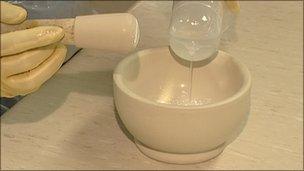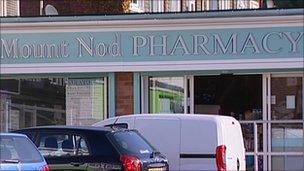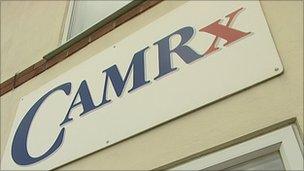Drugs 'specials' cost NHS £160m
- Published

Nova Laboratories in Leicester said that the average price for its specials is about £40
More than £70m a year could be saved from the drugs budget in England, if the government closed a legal loophole.
Official figures show middlemen - or wholesalers - are inflating the price of a group of drugs called "unlicensed specials" - sometimes by thousands of percent.
These are often simple drugs, sold as a liquid instead of a pill to make them easy to swallow.
Across England the cost of specials to the NHS has risen from £57m to £160.5m in just four years.
A saving of nearly £72m could be made if all specials were limited to £75 an item, according to internal NHS sources.
The problem has also been recognised in Scotland and Wales, but the relevant NHS departments were unable to provide figures.
'Within the law'
Using Freedom of Information legislation, the BBC has obtained data that shows that the NHS in Coventry has paid anything from £50 to £1,556 for the same medicine, a blood pressure drug called Captopril Liquid Special 25mg/5mls.
That is just one example in one city.
Stephen Jones, chief executive of Coventry Primary Care Trust, said: "It concerns me because of the level of variation. I don't understand it. I am not sure that when we dig down into it it is fully justifiable."
The price inflation is possible when chemists do not buy directly from a specials manufacturer, but via a wholesaler. The wholesaler adds his costs to the price.
However high the rise in costs, when the chemist submits the prescription, the NHS has to pay because there is no price tariff for unlicensed specials.
Brian Hebron, head of pharmacy at Sandwell and West Birmingham NHS Trust, said: "When we have received these large mark ups, we have asked the NHS Counter Fraud Office to look at it, but they have told us that it is within the law."
NHS Counter Fraud confirmed this.
'Sleep soundly'
Although chemists cannot benefit directly from the price on the prescription, they can receive a "special discount" or cash back at a later date.
Pam Kaur, who runs Vantage Chemist in Coventry, shops around for specials and records some of the lowest prices.
She said she has been offered up to 40% discount or money back by wholesalers who are trying to attract business in the past.
"I think that pharmacy is based around ethics. For me in my pharmacy, it is important to get good value for money for the NHS."
She buys directly from manufacturers. One such manufacturer, Nova Laboratories in Leicester, said the average price for its specials is about £40, but it varies from a few pounds to about £100 for the vast majority of products.
John Seaton, commercial director, said: "We can justify our prices and sleep soundly at night and it is up to others to satisfy themselves."

Ashwin Hindocha runs Mount Nod Pharmacy in Coventry
For the period October 2008 to November 2009, the pharmacy with the highest average cost for specials in Coventry was A & M Pharmacies run by Ashwin Hindocha.
His charges for specials were on average 475% higher than Pam Kaur's.
As well as the £1,556 charge for Captopril, he has submitted a prescription charge of £997 for Omeprazole which can cost as little as £50.
When questioned regarding these charges, Mr Hindocha said that he was disgusted, but that he only found out recently about the high prices.
'Other factors'
He said that he runs a busy chemist, but has since taken steps to reduce the costs.
When asked further about being on the Local Pharmaceutical Committee when the problem with specials was discussed at a meeting he attended in 2007, his solicitor, Noel Wardle, stated that Mr Hindocha had acted in accordance with the drug tariff.
He said: "To a large extent the price claimed is set by specials manufacturers and suppliers.
"It would be impossible for pharmacists to shop around for the lowest price and other factors may be more important such as speed of service, quality, reliability."

Camrx is one of Ashwin Hindocha's suppliers
One of Mr Hindocha's suppliers is Camrx, whose managing director is Rajni Hindocha, Mr Hindocha's brother.
The company was also used by two more of the chemists that submitted the highest prices in Coventry.
In 2008 Camrx offered chemists a 51% discount through a manufacturer, Quantum Specials.
Quantum Specials has denied having anything to do with the discount.
In fact, Quantum Specials wrote to Camrx in November last year, saying customers and NHS primary trusts had made it aware of the high prices Camrx was charging which did not reflect the prices that Camrx was paying Quantum Specials for the medicines.
Quantum Specials said that it did not want to be associated with this practice and that if Camrx did not agree to stop within seven days, then it would stop supplying drugs to Camrx.
However, Camrx said Quantum Specials was aware of, and approved, the deal.
Through a statement from his solicitor, Rajni Hindocha denied any wrongdoing.
It said: "Mr Hindocha has been unable to locate any invoices for Omeprazole or Captopril for the amounts stated.
"The system is complex. Neither Campdale Pharmaceuticals nor Camrx colluded with any pharmacist to inflate the cost of specials medicinal products which were supplied."
'Done quickly'
In the absence of government rules, the NHS is trying to tackle the high prices in other ways.
Hospitals have the right to substitute cheaper drugs which do the same job, so by using a dissolvable tablet instead of a liquid, they can save hundreds of pounds on each item.
Mr Hebron, of the Sandwell and West Birmingham NHS Trust, said: "I think it is outrageous because if I can find ways around having to spend that kind of money on products, then there ought to be a system that prevents the taxpayer having to fund that sort of mark up."
Claire Parker, assistant director of pharmaceuticals at Sandwell Primary Care Trust, has seen her specials drugs bill go up from £40,000 a month to £100,000 a month in a year.
She believes that the answer is for the Department of Health to set a limit on the price of specials as it has done for other drugs.
She said: "There's nothing that we can specifically do in primary care and I believe that they are looking at setting a national tariff, but we need it done quickly so that we can control prices."
A Department of Health spokesperson said: "We recognise the system needs to be reformed.
"The department is working with the Pharmaceutical Services Negotiating Committee (PSNC) on proposals for new payment arrangements for these products."